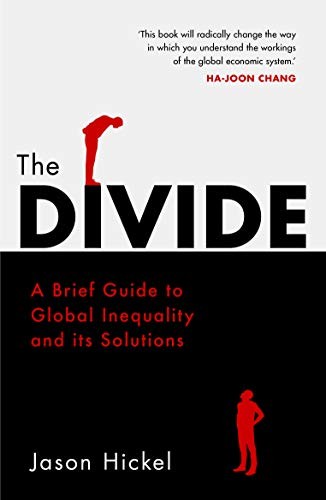vxnxnt reseñó Die Tyrannei des Wachstums de Jason Hickel
An indespensible book for understanding global poverty and inequality
5 estrellas
This book went into a lot of detail, from which I was able to learn quite a lot. It mainly covers the inner workings of the current global economy and answers the question of how poor countries came to be poor and why they will stay poor. In this sense, the book pretty much outdid itself in every regard.
The Divide covers the history of Colonialism and Capitalism as to show how europe enriched themselves by underdeveloping the global south. Hickel takes a look at various sources and historical data to show just how many natural resources (e.g. Gold and Silver) were stolen and the genocide of the indigenous population that followed. Additionally, the author takes a look at many military coups supported by the West and the consequences as such. Hickel goes into great detail explaining how Neoliberalism was born and its first trial in Chile after a …
This book went into a lot of detail, from which I was able to learn quite a lot. It mainly covers the inner workings of the current global economy and answers the question of how poor countries came to be poor and why they will stay poor. In this sense, the book pretty much outdid itself in every regard.
The Divide covers the history of Colonialism and Capitalism as to show how europe enriched themselves by underdeveloping the global south. Hickel takes a look at various sources and historical data to show just how many natural resources (e.g. Gold and Silver) were stolen and the genocide of the indigenous population that followed. Additionally, the author takes a look at many military coups supported by the West and the consequences as such. Hickel goes into great detail explaining how Neoliberalism was born and its first trial in Chile after a coup, which resulted in mass poverty, hyperinflation and mass unemployment. Moreover, the book discusses international institutions such as the WTO, World Bank and IMF. Hickel goes on to write how these undemocratic institutions utilized the global south's national debt to force Neoliberal reforms onto them, which previously employed keynesian economic policies. These reforms are known as Structural Adjustment Programs (SAPs) which privatized, liberalized and deregulated their economies and took the states control of their own economies away. Which of course resulted in more poverty and inequality.
Lastly, Jason Hickel goes into even finer detail discussing the UN's Millennium Development Goals and various statistics. He examines the tactics used to make the results of the statistics as favorable as possible. As a result it would seem as if poverty and inequality are being reduced, while in reality it's becoming much worse. Some of these tactics include not properly adjusting for inflation, setting the bar for absolute poverty much too low and some other faulty methods of gathering and portraying data.
The writing of The Divide was well done and even a bit entertaining, while still giving a good insight into the problems of our current globalized economy. However, I find that the solutions the book provides aren't enough. They are mostly just reforms and suggest taking measures, such as simply democratizing international institutions and cancelling all national debt. Sure, these are good solutions, but they don't really solve the root of the problem, which is an undemocratic economy that presupposes the use of colonialism, imperialism and exploitation of others to guarantee its own existence. For that reason a democratization of the entire economy is a necessity, and not just simple reforms that operate within the current system. Nonetheless, I still find the book to be crucial and I couldn't recommend it enough. It even pairs quite well with Hicklel's second book, Less is More.

